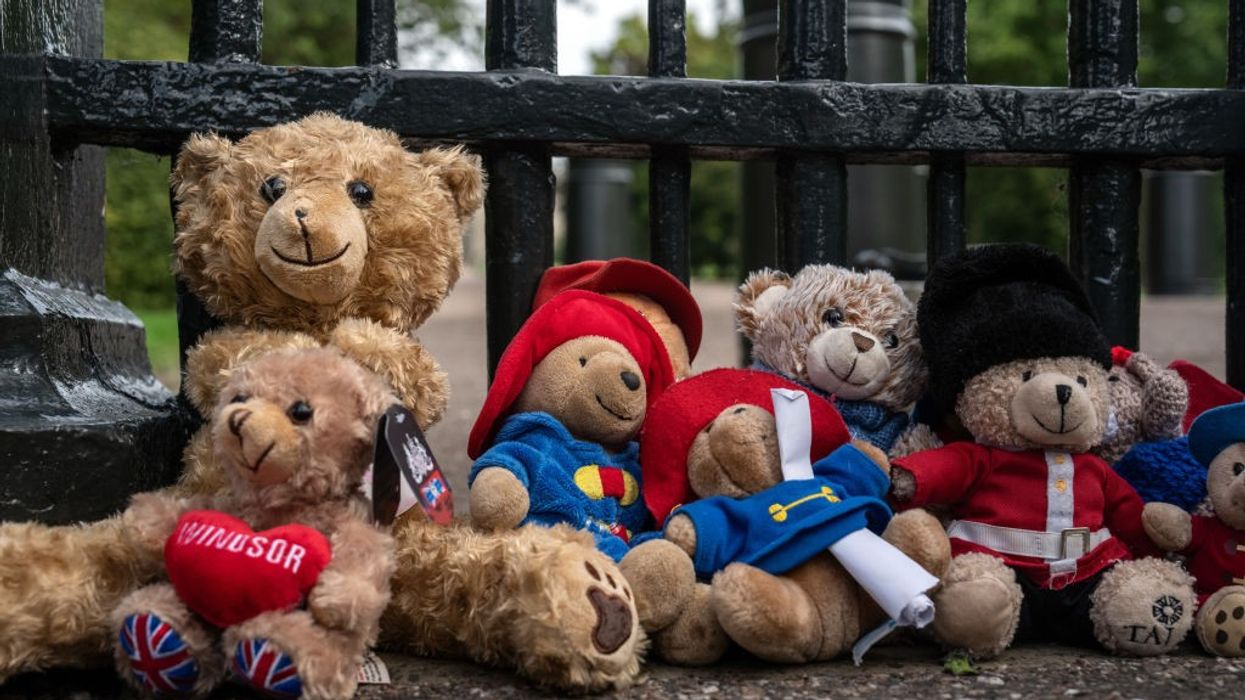To bid farewell to Queen Elizabeth II, Sarah Fowles came to Buckingham Palace with not just flowers but a teddy bear too: Paddington in his red hat and his blue duffel coat.
The beloved children's book character is omnipresent among the thousands of bouquets outside the palace, thanks largely to a video of the queen drinking tea with the bear for her Platinum Jubilee.
So numerous have they become that the Royal Parks -- which oversees Green Park where tributes from the palace are being taken -- on Monday asked visitors not to bring any more soft toys, or marmalade sandwiches, Paddington's favourite snack.
"Paddington is a British institution," said Fowles, who said she hoped to leave her Paddington toy in front of the gates of Buckingham Palace despite the crowds there.
"The video was brilliant. It showed the queen's sense of humour. She knew how to create a connection with people, here with children."
The video created for the queen's jubilee marking her 70 years on the throne in June showed Paddington seated opposite her at the palace and offering her a "Ma'amalade sandwich".
The late monarch, known for her dry sense of humour, politely smiled while the bear cub gulped down her tea from a teapot, before then taking her own marmalade sandwich from her handbag.
She then tapped her teacup with a spoon in time with the drums that began to play Queen's "We Will Rock You" in front of Buckingham Palace.
The video immediately went viral and has remained one of the most joyous moments of a jubilee that, even at the time, had a distinctly valedictory tone.
"It was the last time she did anything public," said Julie Williams, 63, who travelled four hours by train from Manchester to pay tribute.
"It was that kind of thing that created an affinity with people."
'Thank you Ma'am'
Paddington and the queen were both, in their own ways, British institutions dating from the 1950s that have retained public affection down through the years.
While the queen came to the throne in 1952, Paddington first appeared in the book "A Bear Called Paddington" by author Michael Bond six years later.
After the queen's death aged 96, and a 70-year reign, they have found themselves reunited.
Paddington even tweeted from his verified Twitter account after the queen's death was announced: "Thank you Ma'am, for everything".
Among the thousands of flowers, many children have left drawings of Paddington, while the youngest have left coloured in pictures of the bear.
In one, the queen was pictured from behind holding Paddington's hand with the moving message: "I've done my duties Paddington, please take me to my husband."
Another drawing showed Paddington in front of Big Ben, next to the queen wearing a crown. Yet another showed Paddington beneath a rainbow with the words "we will always miss you" in a child's handwriting.
Elsewhere, there was a drawing of the bear lifting his hat and a message: "There is only one queen".
"It's so sweet. I still can't get used to it," said one woman from London, showing off a bear accompanied by a drawing.
Paddington was not the only soft toy there, with other well-wishers leaving stuffed animals or even toy corgis, the queen's beloved dogs.
"They will miss you," one child had written under a sticker of some corgis. Horses were also a popular choice due to the queen's love for riding.
But the tide of commemorative gifts was proving too much to bear for the Royal Parks, which looks after eight historic London parks.
"We would prefer visitors not to bring non-floral objects/artefacts such as teddy bears or balloons," it said on its website.
"We'd prefer that marmalade sandwiches and other foodstuffs were not left because of the negative impact to the park's wildlife," a Royal Parks spokeswoman added to AFP.
(AFP)





